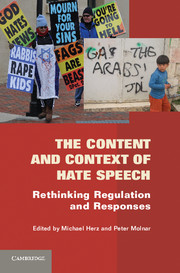Book contents
- Frontmatter
- Contents
- Contributors
- Foreword: Hate Speech and the Coming Death of the International Standard before It Was Born (Complaints of a Watchdog)
- Foreword: Hate Speech and Common Sense
- Acknowledgments
- Introduction
- Part I Overviews
- Part II Refinements and Distinctions
- Part III Equality and Fear
- 16 Hate Speech and Political Legitimacy
- 17 Reply to Jeremy Waldron
- 18 Waldron, Machiavelli, and Hate Speech
- 19 Shielding Marginalized Groups from Verbal Assaults Without Abusing Hate Speech Laws
- 20 Interview with Nadine Strossen
- 21 Interview with Theodore Shaw
- Part IV International Law
- Index
- References
21 - Interview with Theodore Shaw
Published online by Cambridge University Press: 05 June 2012
- Frontmatter
- Contents
- Contributors
- Foreword: Hate Speech and the Coming Death of the International Standard before It Was Born (Complaints of a Watchdog)
- Foreword: Hate Speech and Common Sense
- Acknowledgments
- Introduction
- Part I Overviews
- Part II Refinements and Distinctions
- Part III Equality and Fear
- 16 Hate Speech and Political Legitimacy
- 17 Reply to Jeremy Waldron
- 18 Waldron, Machiavelli, and Hate Speech
- 19 Shielding Marginalized Groups from Verbal Assaults Without Abusing Hate Speech Laws
- 20 Interview with Nadine Strossen
- 21 Interview with Theodore Shaw
- Part IV International Law
- Index
- References
Summary
Peter Molnar: You have had extensive experience litigating civil rights cases. Let’s begin with some questions about the ways, if any, in which free-speech protections that cover even “hate speech” might have affected your litigating efforts. Do you think the way “hate speech” is “free” in the United States made it harder for you to litigate discrimination and segregation in any way?
Theodore Shaw: In fact, nothing comes to mind. Thinking over the many school desegregation cases I’ve litigated, the Voting Rights litigation, a capital punishment case I did in Louisiana many years ago, the housing discrimination cases that I’ve done – I’d have to struggle to think of an example of how constitutionally protected hate speech really interfered with my ability to litigate cases. My answer would have to be right now, “No.”
That does not mean that I have not been exposed to hate speech in my work. For example, I’ve done many school desegregation cases, and I took it for granted that some of the opponents to school desegregation would say hateful things. And they did. I remember being at the Justice Department early in my career, and we would have to respond to citizen mail. Some of the mail that came in criticizing the school desegregation cases we filed was very racist and hateful. But I can't say that that really got in the way of the actual litigation of the cases.
- Type
- Chapter
- Information
- The Content and Context of Hate SpeechRethinking Regulation and Responses, pp. 399 - 414Publisher: Cambridge University PressPrint publication year: 2012
References
- 1
- Cited by

